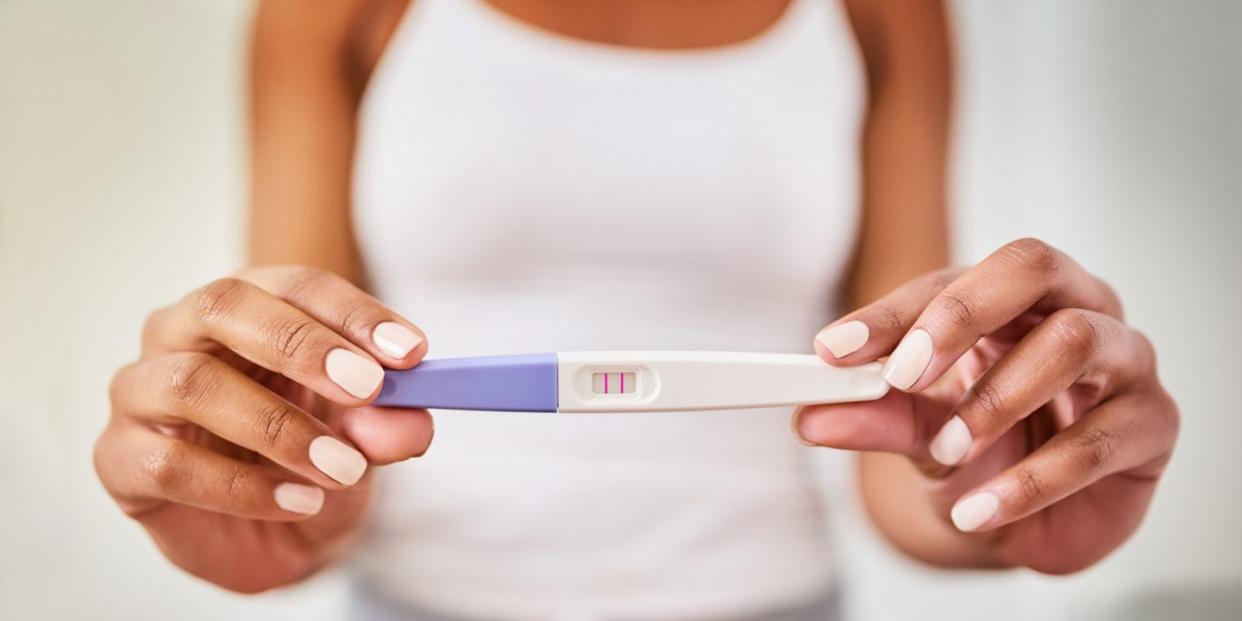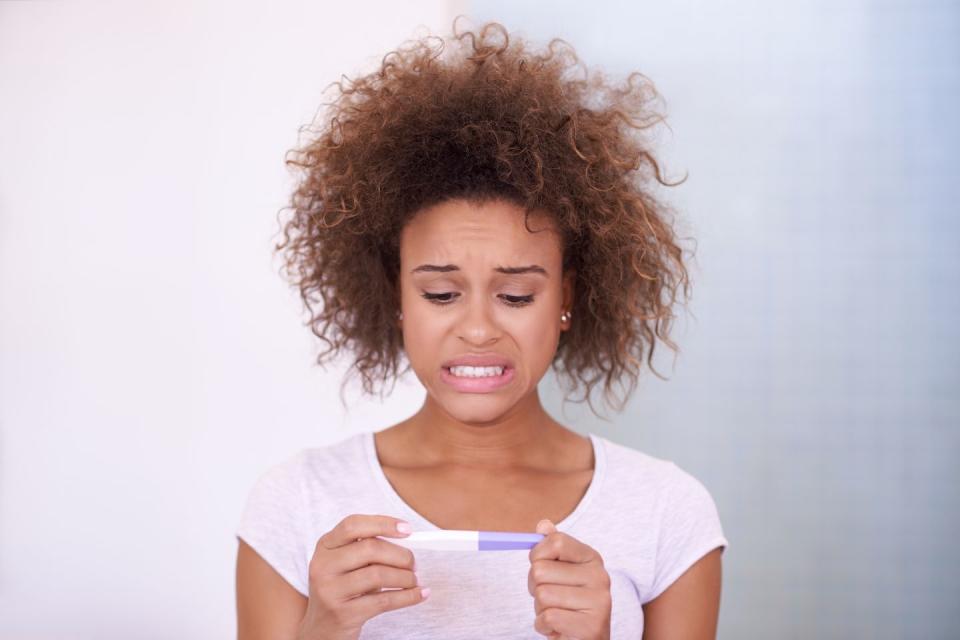Fertility tips: how to get pregnant without stressing

If you're trying for a baby, you will know that while it is technically a magical time, trying to conceive can be hugely stressful. After years of trying not to get pregnant, we're taught to assume that it can happen in the blink of an eye, but the reality is often a little different.
For even the most fertile women, it usually takes several months, especially if you're feeling stressed. In the UK, one in seven couples struggle to conceive, and for many perfectly fertile couples, it can take up to a year to get pregnant.
The good news is according to the NHS More than 80 per cent of couples will conceive within one year if you have sex regularly (every 2 or 3 days) without contraception. Of those who don't conceive in the first year, about half will do so in the second year.
But a year can feel like a very long time when you're trying to make a baby, and the stress can take its toll. Fertility and pregnancy expert Zita West answers the most common questions about how to get pregnant quickly - with the least amount of stress!

Do sexual positions make any difference?
Don't believe everything you read, you don't need to lie upside down to make a baby. 'Not at all, the sperm won’t ‘fall out’ if you don’t lie on a pillow afterwards!' says West.
Can I increase the chance of conceiving?
'I always say that fertility is a whole body event, not just something that happens in the fallopian tubes!' says West. 'You need to take into account diet and nutrition, mind set and lifestyle - for both partners!'
'Men are making sperm 24/7, so the healthier they are the healthier the sperm will be. While women may be born with all the eggs they’ll ever have, you can help create a healthy environment for these to grow in with a healthy diet and lifestyle, and managing stress levels makes a huge difference to hormone balance.'
Is it worth getting tested/checked out?
Think of baby-making as a longterm goal. 'I like to think of the fertility journey as a 15-month plan - 3 months preparation, 9 months pregnancy and 3 months postnatal,' says West.
'So, if you can spend 3 months really getting both you and your partner as baby-ready as possible, then you know you’re in the best shape you can be. It takes on average 8-12 months to conceive, so if it isn’t happening straight away then don’t despair! '
💡 A GP is unlikely to advise any tests before you’ve been trying for a year, but if you do want to have any tests before trying then, you can get these done privately.
When should we visit the doctor?
It pays to do some research. 'If you’ve been trying for over a year then your first port of call will be to go to your GP, but there are some red flags to bear in mind if you're heading toward that point,' says West.
'If your mother had an early menopause, then there is a chance you may follow suit, and if you are in your late 30s or 40s then it may be worth checking for any issues sooner.'
What's the best way to track ovulation?
Panicking about pregnancy apps? Now is not the time to stress. 'Throw out the ovulation sticks and learn to read your body’s signs,' says West.
'The key is cervical secretions - this mucous changes throughout your cycle and is at its heaviest when you ovulate. When you start noticing these, then you are entering your fertile window which is around six days. When these secretions are the consistency of an egg white, then this is when you are ovulating.'
Is charting an accurate way to track fertility?
Most fertility websites advise you to take your basal body temperature every morning, but fertility tracking can add unnecessary stress. 'An egg lasts 12-24 hours and the sperm lasts 3-5 days, so if you aim to have sex around three times a week then there will always be a fresh supply of sperm ready to meet the egg!' says West.
'It is especially important to have sex throughout the fertile window, as you don’t always know when exactly you’ll ovulate - so if you just rely on temperatures and ovulation sticks, you may actually miss the egg being released.'
Nutrition is key to building healthy eggs and sperm. West recommends the following key foods to boost fertility:
🔹 Folate: this is a B vitamin which is key for the developing baby. Folate is found in green, leafy vegetables, broccoli, spinach, parsley, and cabbage.
🔹 Beta carotene: orange and red foods such as tomatoes, carrots and red and orange peppers all contain beta carotene and lycopene, which is especially good for sperm health.
🔹 Eggs: they are a very nutritious food and are very rich in choline, especially the egg yolk. Choline is needed for the developing baby for the brain and the nervous system.
🔹 Beetroot: rich in antioxidants, especially resveratrol, these protect the body from free radicals and they’re also good for blood flow.
🔹 Nuts and seeds: nuts and seeds contain an array of vitamins and minerals and are very good for you in moderation. Brazil nuts contain selenium. Selenium is an antioxidant needed for male and female fertility.
🔹 Good fats: when I talk about good fats, I mean foods like avocados and virgin olive oil, which are really rich in essential fats.
🔹 Red and blueberries: berries are rich in vitamin C. Vitamin C is important to absorb iron and is also an antioxidant.
🔹 Fish: rich in protein, fish is also a good source of omega-3 and vitamin D.
🔹 Samphire: this is a good source of iodine, which is essential because many women are deficient in iodine.
🔹 Yoghurt: this is a rich source of calcium, potassium, and B vitamins, so very good for fertility.
If you struggle to conceive could it be him?
It takes two to make a baby and a lot of the time the focus is on the woman. 'If you are struggling to conceive and have tried everything, then a semen analysis can really help,' says West. 'There is plenty that can be done through nutrition and lifestyle tweaks, so don’t despair if you get a bad result.'
Does coffee affect conception?
Some studies show links between miscarriage and caffeine consumption in women who consume five or more caffeinated drinks a day, so West recommends you go easy on your coffee quota.
➡️ Male impact: caffeine can cause sperm to become hyperactive, affecting their motility.
➡️ Female and Male impact: caffeine can put stress on the adrenals and cause blood sugar to rollercoaster with high peaks and low troughs which also affects energy levels, mood and irritability – not always conducive to intimacy!
How can we reduce stress?
If you're stressed about stressing, you can get into a negative cycle, which can impact fertility. 'Stress management is so important through fertility and pregnancy,' says West. 'If you can take just 20 minutes a day to practice meditation, yoga, or just sitting quietly then this can really help.'
Getting plenty of sleep is also essential for stress reduction!
('You Might Also Like',)

